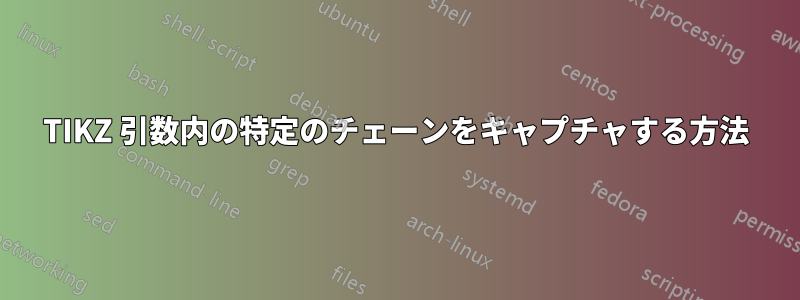
さまざまな種類の 3D 座標 (ここでは sistemaTd と sistemaT2) を描画するマクロを作成しました。tikz に含まれているシステムを使用すると、Y 軸の凡例の位置が間違っています。
さまざまなファイルで何百回も使用している\eixoため、引数の数を変更せずに方法を見つけたい
の定義には次のようなものが必要だと思います\eixo:
IF #2 contains the chain "sistema" DO pos="below" ELSE pos="right" ENDIF
これは例です:
\documentclass{article}
\usepackage{tikz}
\usepackage{ifthen}
\tikzset{sistemaTd/.style={y={(1 cm,0 cm)},z={(0 cm, 1 cm)},x={(-0.5 cm, -0.5 cm)}}}
\tikzset{sistemaTe/.style={x={(0 cm,1 cm)},y={(1 cm, 0 cm)},z={(-0.5 cm, -0.5 cm)}}}
%eixo{dim}{color, etc} Ejemplo: \texttt{eixo}{black!80,sistemaTd,-latex...}
\newcommand{\eixo}[2]{
\begin{scope}[->,#2]
\draw (0,0,0) -- (#1,0,0) node[right]{$X$};
\draw (0,0,0) -- (0,#1,0) node[below]{$Y$}; %node[below]{$Y$}
\draw (0,0,0) -- (0,0,#1) node[right]{$Z$};
\end{scope}
}
\begin{document}
\begin{tikzpicture}
\eixo{3}{gray,sistemaTd}
\begin{scope}[xshift=5.5cm]
\eixo{3}{gray,sistemaTe}
\end{scope}
\begin{scope}[xshift=11cm]
\eixo{3}{gray} %note the legend of Y axis
\end{scope}
\end{tikzpicture}
\end{document}
答え1
ここで、 を使用して文字列区切り文字をlistofitems検索します。 見つかった場合 (リストの長さが 1 より大きい場合)、指定子が使用され、そうでない場合は が使用されます。#2sistemabelowright
\documentclass{article}
\usepackage{tikz}
\usepackage{ifthen,listofitems}
\tikzset{sistemaTd/.style={y={(1 cm,0 cm)},z={(0 cm, 1 cm)},x={(-0.5 cm, -0.5 cm)}}}
\tikzset{sistemaTe/.style={x={(0 cm,1 cm)},y={(1 cm, 0 cm)},z={(-0.5 cm, -0.5 cm)}}}
%eixo{dim}{color, etc} Ejemplo: \texttt{eixo}{black!80,sistemaTd,-latex...}
\newcommand{\eixo}[2]{
\begin{scope}[->,#2]
\draw (0,0,0) -- (#1,0,0) node[right]{$X$};
\setsepchar{sistema}%
\readlist\argtwo{#2}%
\ifnum\listlen\argtwo[]>1\relax
\draw (0,0,0) -- (0,#1,0) node[below]{$Y$};
\else
\draw (0,0,0) -- (0,#1,0) node[right]{$Y$};
\fi
\draw (0,0,0) -- (0,0,#1) node[right]{$Z$};
\end{scope}
}
\begin{document}
\begin{tikzpicture}
\eixo{3}{gray,sistemaTd}
\begin{scope}[xshift=5.5cm]
\eixo{3}{gray,sistemaTe}
\end{scope}
\begin{scope}[xshift=11cm]
\eixo{3}{gray} %note the legend of Y axis
\end{scope}
\end{tikzpicture}
\end{document}
問題を正しく理解していれば、X ラベルの位置も調整するバージョンは次のとおりです。
\documentclass{article}
\usepackage{tikz}
\usepackage{ifthen,listofitems}
\tikzset{sistemaTd/.style={y={(1 cm,0 cm)},z={(0 cm, 1 cm)},x={(-0.5 cm, -0.5 cm)}}}
\tikzset{sistemaTe/.style={x={(0 cm,1 cm)},y={(1 cm, 0 cm)},z={(-0.5 cm, -0.5 cm)}}}
%eixo{dim}{color, etc} Ejemplo: \texttt{eixo}{black!80,sistemaTd,-latex...}
\newcommand{\eixo}[2]{
\begin{scope}[->,#2]
\setsepchar{sistema}%
\readlist\argtwo{#2}%
\ifnum\listlen\argtwo[]>1\relax
\draw (0,0,0) -- (#1,0,0) node[right]{$X$};
\draw (0,0,0) -- (0,#1,0) node[below]{$Y$};
\else
\draw (0,0,0) -- (#1,0,0) node[below]{$X$};
\draw (0,0,0) -- (0,#1,0) node[right]{$Y$};
\fi
\draw (0,0,0) -- (0,0,#1) node[right]{$Z$};
\end{scope}
}
\begin{document}
\begin{tikzpicture}
\eixo{3}{gray,sistemaTd}
\begin{scope}[xshift=5.5cm]
\eixo{3}{gray,sistemaTe}
\end{scope}
\begin{scope}[xshift=11cm]
\eixo{3}{gray} %note the legend of Y axis
\end{scope}
\end{tikzpicture}
\end{document}
答え2
軸が水平か垂直かをその場で確認し( を使用calc)、その情報に応じてラベルを添付することができます。こうすることで、座標系を追加したり、その定義を変更したりしても、引き続き機能します。
\documentclass[tikz,border=3mm]{standalone}
\usetikzlibrary{calc}
\tikzset{sistemaTd/.style={y={(1 cm,0 cm)},z={(0 cm, 1 cm)},x={(-0.5 cm, -0.5 cm)}}}
\tikzset{sistemaTe/.style={x={(0 cm,1 cm)},y={(1 cm, 0 cm)},z={(-0.5 cm, -0.5 cm)}}}
%eixo{dim}{color, etc} Ejemplo: \texttt{eixo}{black!80,sistemaTd,-latex...}
\newcommand{\eixo}[2]{
\begin{scope}[->,#2]
\draw (0,0,0) -- (#1,0,0)
let \p1=($(#1,0,0)-(0,0,0)$),\n1={abs(sin(atan2(\y1,\x1))))} in
\ifdim\n1<0.4pt [below] \else [right] \fi node {$X$};
\draw (0,0,0) -- (0,#1,0) let \p1=($(0,#1,0)-(0,0,0)$),\n1={abs(sin(atan2(\y1,\x1))))} in
\ifdim\n1<0.4pt [below] \else [right] \fi node {$Y$};
\draw (0,0,0) -- (0,0,#1) let \p1=($(0,0,#1)-(0,0,0)$),\n1={abs(sin(atan2(\y1,\x1))))} in
\ifdim\n1<0.4pt [below] \else [right] \fi node{$Z$};
\end{scope}
}
\begin{document}
\begin{tikzpicture}
\eixo{3}{gray,sistemaTd}
\begin{scope}[xshift=5.5cm]
\eixo{3}{gray,sistemaTe}
\end{scope}
\begin{scope}[xshift=11cm]
\eixo{3}{gray} %note the legend of Y axis
\end{scope}
\end{tikzpicture}
\end{document}





